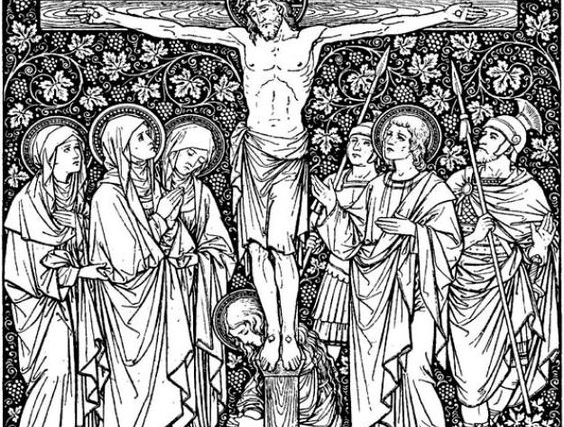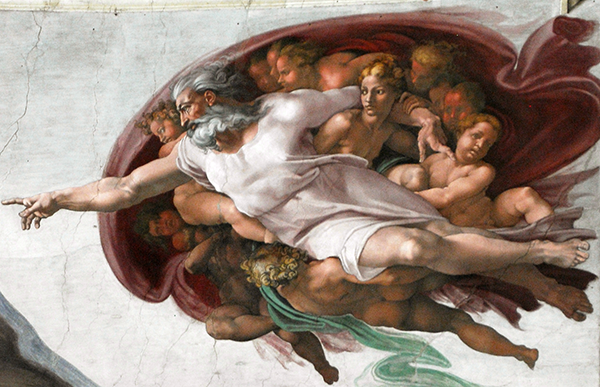“Whoever tries to keep his life will lose it, and whoever loses his life will preserve it.” -Luke 17:33
Praying for salvation in the world to come
Praying for your own selfish ends
Is only piling on more and more
Self-centeredness and arrogance
Die – then live
Day and night within the world
Once you’ve done this, then you can
Hold the world right in your hand!
– Song of Original Mind, Bankei
In the Roman Catholic Church, we often sing hymns that echo the concept of death and resurrection. “Then by your cross we were saved; dead became living.” “We come to break the bread; we come to know our rising from the dead.” These are the words of a few such hymns that come to mind. But the power of this message often is lost.
In the contemporary Western Christian tradition, in my opinion, death and rebirth are much talked about and little attended to. In the Buddhist tradition, death and rebirth are much attended to and little talked about. These two verses from the long poem Song of Original Mind, written by the Seventeenth Century Japanese Zen master Bankei is one of the very few explicit references to death and rebirth within the Buddhist literature. Although there are a number of other references, most of them are very oblique. This is a subject that is talked about between teacher and student, not much written about.
It is clear that death and rebirth were very important to the early Christians. There are many references to dying and being reborn in the Christian Scripture. There is the passage from Luke, which we have just heard, and others like it. We have the statement by Saint Paul, “I have been crucified with Christ; and it is no longer I who live, but Christ who lives in me.”
Jesus spoke often about death and rebirth, at least as it is recorded in Christian Scripture. And the concept was shocking. Think of Jesus’ conversation with Nicodemus, when Jesus told him that he must be born again. Nicodemus’ shocked response was, “How can a man be born when he is old? Can he enter a second time into his mother’s womb and be born?” If we are honest with ourselves, we might well ask the same question. The problem is, of course, that we have gotten used to Jesus’ answer, that we must be born of water and the Spirit. Therefore we think we understand what this is all about, and therefore we fail to hear how shocking Jesus’ message is.
Another problem is that Christianity has tended to conflate the experience of physical death and the concept of bodily resurrection with this demand of Jesus. I believe that Jesus meant what he said, and that he was speaking not of something superficial, but of a profound, earth-shattering experience in this lifetime. A conversion so powerful that the person knows he or she is no longer the same person. But how can we get at what Jesus was talking about?
Again, I feel that Buddhism has some important insight to offer. Buddhists speak of the Great Death and the Great Rebirth. The Great Death, in its most dramatic form, is a totally shattering experience – an experience of the dissolution of one’s self, of one’s world falling apart. The person is left not knowing who he or she is or what the world is. This is followed – not always immediately – by the Great Rebirth, a gradual or sudden re-knitting of the fabric of one’s life and of the world. But now everything is totally new, is luminous and filled with compassion.
Some weeks ago, I was sitting in a doctor’s waiting room, looking for something to read as I waited. Among the year-old copies of Newsweek and back issues of Golf Digest, I found the October 2003, issue of AARP The Magazine and pounced on it. In the magazine was a story about the boxer George Foreman. It is astounding that I read it at all, since I have not only no interest in boxing, but have a definite antipathy towards it. But there, on the page, was the following:
To understand George Foreman, you have to understand what happened – or what he says happened – on March 17, 1977. On that evening in Puerto Rico, Foreman, who was a leading contender for the heavyweight title, lost by unanimous decision to Jimmy Young, who was a light-hitting fringe contender from Philadelphia. This was a major upset, a fight Foreman was supposed to win easily. The fight, however, was a minor event in George’s life. What came after the fight was a life-changing event.
William James, in his famous book Varieties of Religious Experience, describes events like the one Foreman experienced that night as a “discharging lesion of the occipital cortex.” Cynical boxing writers had less-kind words for it, like “stunt” and “excuse.” A few medical experts attributed Foreman’s experience to dehydration coupled with exhaustion. Gil Clancy, Foreman’s trainer at the time, said that George had suffered from “heat prostration.”
In Foreman’s version, he at first plunged into despair, He thought that he literally had died. Then he felt a giant hand carrying him out of the emptiness around him. He became several different people. Then he felt his head and his hands had begun to bleed. He began yelling, “Jesus Christ is coming alive in me!”
Foreman ran to the shower. His alarmed handlers tried to stop him. He started to shout, “Hallelujah, I’m clean! Hallelujah, I’ve been born again!”
He left the shower and kissed everyone in the room, telling them he loved them. He said he heard the voice of God.
Whatever it was that happened, the sullen, scary bitter George Foreman was dead. The loveable George Foreman was born.
I was stunned. Take the references to Jesus out of it, and you would have a description of the great enlightenment experience that could have come from any Buddhist. Of course, any Zen teacher would want to spend some time with Mr. Foreman, ask him some questions, to determine if it really was authentic, but all the signs are there. The earth shattered and re-knit. The total despair and sense of having died. Followed (albeit rather closely) by a sense of coming to life with great joy. But, most importantly, with a significant and lasting change in the person. Mr. Foreman, by all accounts, was formerly overbearing and surly, disliked even by his trainers. He was transformed into a loving and loveable person. The boxer became a preacher, much loved by his congregation. And this article was written in 2003, twenty-six years after the event. It’s a good bet that the change will last.
While a number of such spontaneous awakenings are well documented, they are extremely rare. Usually, it takes many years of hard work and great determination to come to such an awakening.
In both the Buddhist and Christian traditions – and probably many others as well – the most common route to the Great Death is through years of meditation and spiritual practice. When after years of intense practice, the Great Awakening occurs, it often seems that it has suddenly arisen. It is described as being as sudden and unanticipated an experience as Mr. Foreman’s. And as earth shattering. People often relate that they alternately laughed and cried for days afterwards. And they were profoundly changed. Their whole world was transformed.
But what is this Great Death? What dies?
According to the Buddhists, it is the self. We have a fixed notion of ourselves, and we organize our entire universe around that self. We have a sense that we are independently existing, eternal beings. And we have fixed notions of the world around us. We experience the world in relationship to our assumed individual selves. What we see when we look at the world is our own egos writ large. We even define God in relationship to ourselves. We create God very much in our own image. It is spiritual practice that slowly erodes that notion of self and all of our opinions about reality. But when our fixed ideas and sense of self finally dissolve, it feels totally new. It is experienced very much as a sudden dawning of new light – the working of grace, the compassionate embrace of the Buddha, an unexpected gift from God.
When I read the recorded sayings of Jesus, it so often seems to me that he was talking about the same thing. It is our selves – our self-clinging – that must die. If we try to keep our own life, if we cling to our own self, we will lose it. When we let go of our own lives, of our selves – when we freely fling them away – then we truly gain life.
It seems that Jesus was sometimes impatient with our self-clinging. Impatient to accomplish the task of bringing us to life. Impatient with our stubborn resistance to waking up. How else can we understand his saying, “I came to cast fire upon the earth; and would that it were already kindled!?” Or his calling his own disciples a “faithless and perverse generation” and asking how much longer he had to put up with them?
It is the work of most meditation practice to loosen our grip on ourselves, to help us open our eyes to reality, to God. To experience reality as it really is. In Zen, it is the particular genius of koan study to systematically strip away our delusions and self-clinging. It is most frequently in the context of such practice that the experience of a Great Death and Great Rebirth occurs.
There is, however, another path to learning to clearly see, of coming to know God or one’s own true self. That is the life well lived. A lifelong habit of openness to others, often of self-effacement. Saint Therese of Lisieux is a shining example of this path, a young woman whose whole aim in life was to make herself smaller and smaller until there was nothing left. This is the path of ordinary life, not just the province of saints. I have been blessed to know a number of such people – people who are totally transparent to God, who radiate holiness, all the while believing they are not in any way special. I imagine that everyone has encountered some of the saints in their lifetimes. Saints who are so holy that their holiness is unknown even to themselves. This is, by far, the harder path to awakening.
As Bankei so eloquently says in his poem, when we let go of our own ego-clinging, our own self-centeredness, we do truly die. But then we can truly live. We do indeed find that we hold the world right in our hands. That this world in which we live is the promised land. That we are the Christ. We are the Buddha. We are the anointed awakened ones. The whole universe shimmers with compassion and joy. This death is truly a new birth into that fullness of life that we call eternal.
While I was writing this, one of the members of our Zen group sent us this quote from Rabbi Menachem Mendel of Kotzk. “I have the power to resurrect the dead. But I would rather resurrect the living.” I am sure that Jesus had a great sense of humor and would have loved this statement. And I think even old Shakyamuni had a twinkle in his eye. I believe that both Jesus and Shakyamuni would have agreed that this was their life mission. May it also be ours.


